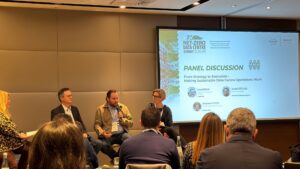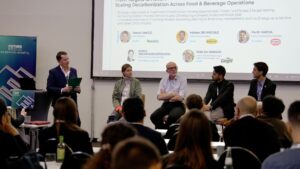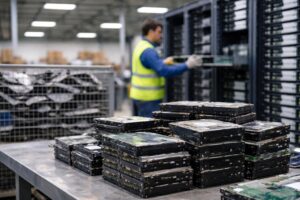The 3rd Net Zero Food Beverage Forum in Berlin, Germany on January 15-16, 2025, brought members of the food beverage industry, energy suppliers, and sustainability experts together to address the industry’s current roadblocks in achieving net-zero targets. The forum stood out as a pivotal platform for knowledge exchange, networking, and innovation, with its rich lineup of expert-led sessions and diverse sponsorships contributing to meaningful discussions. So, this article provides a detailed recap of the sessions and highlights the contributions of the esteemed sponsors.
Sessions at the 3rd Net Zero Food & Beverage Forum
The 3rd Net Zero Food Beverage Forum featured several carefully planned sessions featuring creative ideas, thought leadership, and proven case studies. Below, we summarize the key takeaways from 3rd Net Zero Food & Beverage Forum:
Nurturing a Co-op for the Future
Audrey O’Shea, Head of ESG Strategy & Partnerships at Tirlán, spoke on the role of place, heritage, and values in net zero. The speaker stressed mutual development. This is through climate, nature, and circular economy. So, the session offered hands-on advice to companies that want to embed environmental objectives in their values. It also illustrated the need for a community-based approach in the food and beverage sector.
Becoming a B Corp as a Private Label Manufacturer
Andrea Bolhuis, Sustainability Manager at Burg Group, described the companies’ experience of looking towards B Corp certification. The speaker presented their sustainability governance framework, approaches for carbon emissions reduction across Scope 1, 2, and 3, and the role of residual waste reduction in production teams. So, the session highlighted the concrete gains of implementing a rigorous sustainability approach while building internal stakeholder engagement and external trust in the market.
Unlocking the Benefits of Sustainability & Decarbonization in the F&B Industry.
Jose (Pepe) Buitrago, Global Business Developer, Siemens Smart Infrastructure at Siemens took this session. The presentation at the 3rd Net Zero Food & Beverage Forum was on how sustainability and decarbonization are not only about operational cost savings. The speaker further talked about how organizations can meet regulatory requirements, access incentives, and enhance brand reputation through innovative solutions. So, this session emphasized the importance of adopting a forward-thinking approach in the F&B sector.
Success Factors in Setting up Decarbonisation Programmes Across F&B Production Sites
Vincenzo Giordano, Director of Sustainability Solutions at ENGIE Impact shared findings from the Engie Impact 2025 Net Zero Report. The speaker presented examples of the F&B sector’s best practices and case studies that discussed effective decarbonization strategies. So, the session offered attendees practical recommendations for addressing emissions within production facilities in a way that makes sustainability initiatives scalable and quantifiable.
Sustainable Sourcing of Raw Materials: How to Create a Virtuous Circle
Francesca Angiulli, Group Sustainability Director at Puratos, discussed how to intervene where it counts, by measuring, ranking, planning, and tracking sustainable sourcing. Moreover, the speaker highlighted a transition from vendors to partners and a holistic approach, outside of the net zero framework. So, this session offered practical insights into creating a truly sustainable and collaborative supply chain.
Integrating Sustainability into Daily Business Operations: Strategies for Effective Management
Violeta Costa, Global Environment Sustainability Director at GBFoods described approaches for promoting a sustainability-driven culture. Furthermore, the speaker talked about setting up structures of governance, building coalitions with internal stakeholders, and networking with external partners. So, the session offered attendees practical tools to integrate sustainability into routine activities, thereby providing a direct linkage to higher-level environmental objectives.
How to Reduce Energy Consumption by 30% – Evaporation as Service Case Study.
Kristaps Greidāns of Adven and Jarmo Lahtinen of Honkajoki Oy presented a case study on achieving 30% energy saving. They talked about how to reduce steam utilization and increase energy efficiency. Moreover, the speakers discussed how to increase competitiveness and reduce carbon dioxide (CO2) emissions. So, this session highlighted the value of innovative approaches like “Evaporation as a Service” in achieving sustainability in food industry.
Engineering for a Better World A Holistic Approach Towards Resource-Efficient Solutions.
Dr. Isabel Osterroth and Bastian Tolle from GEA presented a holistic methodology for decarbonization and waste heat utilization. They reflected ideas about energy saving and also concrete examples of green product design. So, attendees learned about comprehensive engineering strategies to create resource-efficient operations in existing facilities. This demonstrates the importance of integrating technology with sustainability.
Climate Action to The Next Level – Intersnack’s Commitment to Reducing Its Emission Foot-print Driven Through a Zero-loss Approach
Dr. Markus Hadley, Head of Group Energy Management at Intersnack Group explained how the company addresses climate impacts on its business model as a savory snacks leader. The speaker presented their Scope 1 climate mitigation plan and SBTi roadmap to 2032. Moreover, the session went through strategic levers that are decoupling economic growth and increasing emissions.
The Benefits of Electrifying Industrial Food Production
David Sarhok, Account Manager Europe for F&B processing and equipment at Watlow talked about the future of electrifying food production. The speaker described key directions for decarbonization, with process heat and the need for very tight control at the center. Moreover, case studies illustrated the transformative impact of electrification in reducing emissions and enhancing operational efficiency in food and beverage production.
Circular Thermal® – Efficiently Integrating High-Temperature Heat Pumps in Industrial Processes
Rossen Ivanov, Managing Director at Armstrong International presented their Circular Thermal® approach. Furthermore, the speaker described how these industrial heat pumps and direct heat recovery help increase thermal efficiency and diminish primary energy requirements. So, this session highlighted practical solutions for integrating high-temperature heat pumps into light industrial processes, especially in the food and beverage sector.
Sustainable Heating as a Key Ingredient in Our Net Zero Recipe for Chocolate
Kristof Hubin, Global Energy & Co@ Director at Barry Callebaut, presented the importance of heat and cold requirements in chocolate plants. Moreover, the speaker described the conventional roasting process as well as the difficulties faced in reaching net zero. So, this session offered the participants practical knowledge on how to meet their energy supply requirements. This is with sustainability in mind in chocolate processing.
Driving Decarbonization within the Operations and Value Chains of a Leading Global Merchant and Processor in the Food & Ag Sector
Dr. Meinrad Bürer, Global Technical Director of Climate & Decarbonization at Louis Dreyfus took this session at the 3rd Net Zero Food & Beverage Forum. The speaker outlined strategies for reporting Scope 1, 2, and 3 and target setting in the food & Ag sector. Moreover, the speaker then presented some of the main levers for decarbonizing the food and agriculture industries. So, the focus of the session highlighted the necessity of integrative data management and value chain cooperation. This is to drive substantial emission cuts.
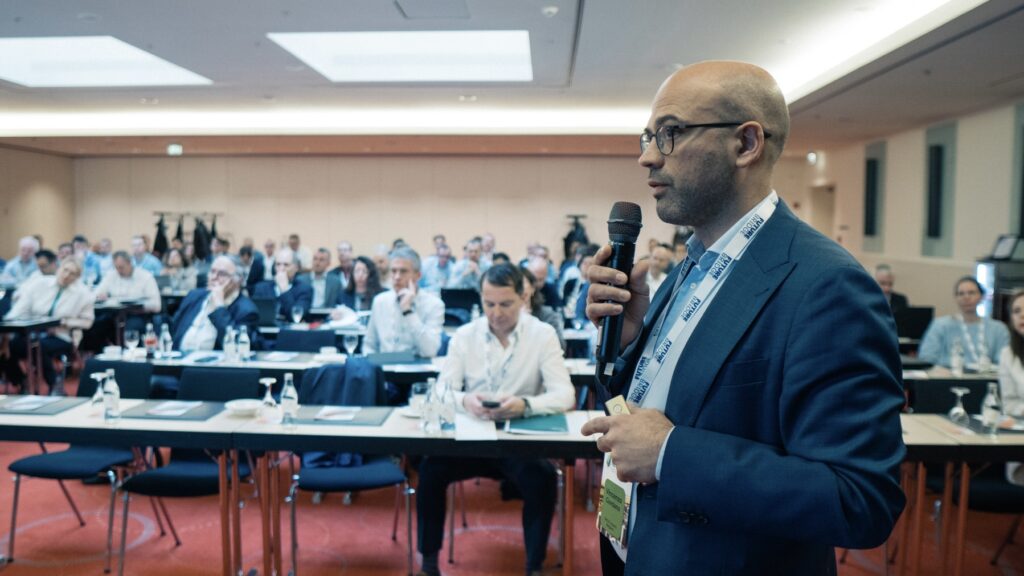
Panel Discussion: Production and Operational Optimization of Processes to Enable Optimal Integration of Best Available Energy Technologies on The Path To Decarbonization
Tomaz Oresic of Resalta Paul, Paul Kennedy of Danone, and Francesca Angiulli of Puratos searched for an efficient way to manage the production processes. They reviewed the integration of high-performance energy technologies to meet decarbonization objectives. So, this panel presented a wide range of perspectives as well as practical approaches to achieving energy efficiency in operations.
Panel Discussion: Rethinking Food Beverage Sustainability Lessons Learned and Next Horizon.
Andy Manley from Siemens, Dr. Jan-Maarten Geertman from Heineken, Dr. Isabel Osterroth from GEA, and Dr. Markus Hadley from Intersnack Group participated in this panel. They presented insights associated with the introduction of sustainability strategies, as well as future directions of the F&B industry. So, the session encouraged collaboration and innovation for long-term impact.
Energy Efficiency in the Light Industry, Including Food and Beverages
Claudia Canevari Head of Unit, Energy Efficiency Policy and Financing (Unit ENER.B2), Directorate-General for Energy, European Commission took this session. The speaker spoke about the Energy Efficiency Directive and what role it plays in achieving decarbonization. She stressed the need for energy audits, management systems, and waste heat recovery. So, in this session, the participants received a robust basis for the implementation of energy efficiency measures in the light industry.
Energy Transition Opportunities in the Edible Oil Industry
Erik Schweitzer, Director of Operations Excellence, Food Solutions at Bunge discussed energy transition technologies and renewable energy resources. Furthermore, the speaker discussed internal change management and the role of subsidies and taxes in enabling the energy transition. So, this session offered targeted insights into decarbonizing edible oil production processes.
Decarbonizing Process Heat in the F&B Industry: Using High-Temperature Heat Pumps and Mechanical Vapor Compressors
Emanuele Mazzola, Sales Engineer for Renewable Heating Solutions at Turboden described the mechanisms of steam electrification and waste heat valorization. He explained the use of mechanical vapor compressors and heat pumps for the F&B applications through case studies. So, attendees gained a deeper understanding of leveraging renewable heating solutions for decarbonizing industrial processes.
Decarbonization Solutions to Implement Now: The Recovery and Reuse of Waste Heat
Sam Mawby, Managing Director of Europe at Thermal Energy International described the obstacles in decarbonizing thermal heat and proposed a “stepping stone” strategy to produce immediate cost savings. Moreover, the speaker described how waste heat recovery techniques increase efficiency and decrease emissions from food and beverage operations.
Danone Re-Fuel Energy Efficiency & Decarbonization: From Strategy to Implementation
Paul Kennedy, Global Zero Carbon Director at Danone shared updates on the Re-Fuel Energy Excellence program launched in 2022. Furthermore, the speaker explained the program’s governance, corporate strategy embedding, and current limitations. So, the session provided practical insights into building and implementing effective decarbonization programs.
From Waste Towards Resource Recovery: Case Agro Food Industry
Johan Raap, Senior Environmental Technologist at Royal Cosun explained to use of anaerobic digestion to generate energy and not consume it. The speaker further talked about converting organics in water into methane for energy. Moreover, the session went through resource recovery techniques that conserve groundwater and potable resources. So, this session emphasized shifting from pollution prevention to energy generation for sustainability in food industry.
Proved Reduction of Energy Consumption through Specialty Lubricants
Luiz Fernando Faccin and Felix Schulze from Klüber Lubrication showcased case studies on energy efficiency using specialty lubricants. Moreover, they described the importance of energy saving in the food sector and explained how tailored lubricants lead to emission reduction.
HVAC Solutions to Drive Sustainable Operations While Staying Competitive
Amr Rizk, Offering Manager, Industrial Processes at Honeywell discussed the role of heating and cooling processes in Scope 1 and 2 emissions. Furthermore, the speaker shared how Solstice and centrifugal compressor technologies enable decarbonization. This is while maintaining competitive operations. This session gave valuable insights on how to design sustainable HVACs.
The Challenges & Opportunities of Executing a Corporate Sustainability Strategy within a Global Operations Network.
Susanne Folkerts, Global Operations Head of Sustainability Environment at Olam Food Ingredients took this session at the 3rd Net Zero Food & Beverage Forum. The speaker outlined tactics for sustainability implementation across different operations. Moreover, the speaker described how to make the best use of internal and external forces and thereby identified the key potential of meeting sustainability goals.
Decarbonization Initiatives in the Juice Sector
Aintzane Esturo, Technical Director International Fruit and Vegetable Juice Association described IFU and why the juice sector is focused on sustainability. The speakers also described actions taken by IFU members with a particular focus on the work that needs to be done as part of decarbonizing the industry.
Large-Scale Air Source Heat Pumps: A Feasible & Reliable Way to Decarbonize Heating
Jan Hübner, Area Sales Manager at Günter presented the optimization of air-source heat pumps in the context of sustainable heating. Furthermore, the speaker discussed design and installation best practices, key adoption landmarks, and challenges to overcome. So, the session highlighted the paramount importance of heat pumps in the attainment of climate targets.
Water Stewardship and What Is Expected from Industrial Companies
Ben Davis, Sector Coordinator at AWS described water stewardship concepts and their applications to the industrial sector. Moreover, the speaker described practices for reducing water consumption, reducing pollution, and supporting sustainable water management. So, this session prompted stakeholders’ engagement to work on common water problems.
3rd Net Zero Food & Beverage Forum: Looking At The Event Partners
Event partners at the 3rd Net Zero Food Beverage Forum brought their valuable expertise to the table. This section points out their contribution to advancing discussions on sustainability in food industry:
Siemens – Gold Sponsor
Siemens, a worldwide technological innovator, is dedicated to revolutionizing industries through the integration of digital and physical offerings. The company, with its expertise in infrastructure, transport, and industrial systems, contributes to the sustainable operation of different sectors, such as the F&B industry. At the 3rd Net Zero Food & Beverage Forum, Siemens presented the advantages of sustainability and decarbonization. Furthermore, the company provided attendees with practical tips, for operational savings, regulatory compliance as well as energy efficiency. So, their expertise enabled the participants to reinvent industrial layouts, enhance their brand perception, and embrace new-generation solutions for sustainable development in a competitive space.
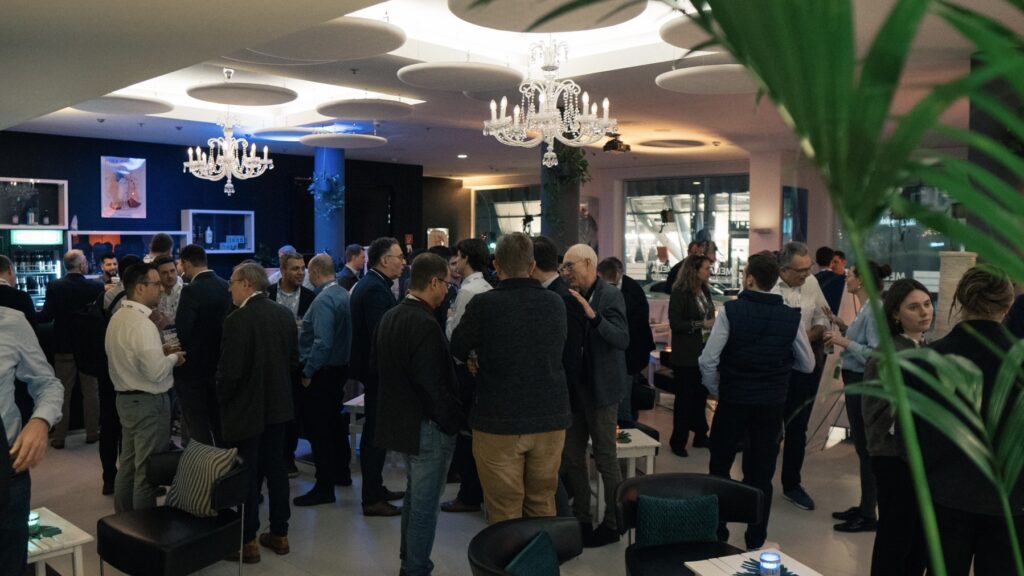
Adven – Silver Sponsor
Adven is an energy company driving sustainability through innovative solutions like geo-energy, steam, and district heating. Furthermore, with more than 50 years of experience and 350 operational facilities, Adven excels in the maximization of energy systems in Europe. They presented at the summit strategies to lower energy consumption and CO₂ emissions, which positively impact resource efficiency and competitiveness. Participants learned how to apply energy-saving solutions, meet sustainability targets, and save money. This also underscores Adven’s commitment to a greener future for the food and beverage sector.
Watlow – Silver Sponsor
Watlow, a leader in industrial thermal solutions, boasts over a century-long history of innovation. With a diverse product portfolio including advanced temperature controllers and heating technologies, Watlow serves several industries, such as food processing. At the summit, they discussed the electrification of food production and the importance of thermal control. Through real-world case studies, attendees got to learn how to decarbonize, optimize, and achieve sustainability goals. This cemented Watlow’s position as a key enabler for clean energy applications in industrial settings.
GEA – Silver Sponsor
GEA, an international technology group, focuses on resource-efficient systems and components in the F&B and pharmaceutical industry. Being an employer of 18,000 people as well as operating in 150 countries, GEA contributes to industrial decarbonization through high-tech and integral engineering solutions. The company shared ideas on waste heat recycling, energy saving, and sustainable product solutions at the 3rd Net Zero Food & Beverage Forum. So, attendees gained practical insights into implementing innovative decarbonization methodologies, empowering them to enhance production efficiency and sustainability. This aligned with GEA’s vision of “Engineering for a better world”.
Armstrong International – Silver Sponsor
Armstrong International, a family-owned thermal systems leader since 1900, offers steam management, heat pump technologies, condensate control, and more. Familiar with decreasing primary energy consumption, Armstrong focuses on the thermal decarbonization of several industries. The company presented its Circular Thermal® approach at the summit and reflected on opportunities for thermal recovery and energy efficiency. So, attendees acquired practice-ready insights into improving low-grade heat and improving efficiency. This further reinforced Armstrong’s commitment to sustainability and operational excellence in food and beverage manufacturing operations.
Klüber Lubrication – Bronze Sponsor
Klüber Lubrication, as the top player in the field of specialty lubricants, provides high-performance tribological application solutions designed according to the customer’s requirements. Through more than 90 years of experience and operation in 30 countries the company guarantees energy-efficient processes across industries. At the summit, Klüber lubrication demonstrated the importance of specialty lubricants in conserving energy and operating costs. So, attendees benefited from case studies showcasing proven energy savings, and gaining insights into optimizing industrial processes. This is while maintaining sustainability and competitiveness in the food and beverage sector.
Turboden – Bronze Sponsor
Turboden, a subsidiary of Mitsubishi Heavy Industries, is one of the world’s leading authorities in Organic Rankine Cycle (ORC) systems. The existing systems produce electrical, thermal, and HVAC power as well from combined sources of energy. These include biomass, geothermal energy, hydrocarbon,s and waste heat from industrial processes. At the 3rd Net Zero Food & Beverage Forum, the company presented solutions for waste heat valorization and steam electrification. Attendees learned the practical applications of heat pumps and mechanical vapor compressors. Moreover, they gained strategies to reduce emissions, enhance efficiency, and transition towards sustainable energy in food and beverage production.
Engie Impact – Bronze Sponsor
Engie Impact hastens sustainability transformation for enterprises, municipalities, and administrations. This is by utilizing data-driven best practices, global access, and interdisciplinary knowledge-tailored roadmaps to achieve success. Furthermore, by integrating solutions across energy, water, waste, and carbon resources, Engie Impact helps clients achieve environmental and economic goals. They discussed the findings of their 2025 Net Zero Report and case studies of the F&B industry at the summit. So, attendees gained valuable knowledge on setting up effective decarbonization programs, enhancing resource efficiency, driving growth, and meeting stakeholder expectations.
Thermal Energy International – Bronze Sponsor
Thermal Energy International is an authority in thermal efficiency solutions. The company shows expertise in recovering sensible and latent heat from exhausts for reuse throughout plants. Using tailored methods, the company assists a variety of industries, such as food and beverage, in their decarbonization objectives. At the 3rd Net Zero Food & Beverage Forum they showcased methods for reusing waste heat to enhance efficiency and lower energy costs. So, attendees gained actionable strategies to optimize thermal systems. This displayed the critical role of innovative technologies in achieving immediate cost savings and long-term sustainability targets.
Güntner – Presenting Partner
Güntner is a global leader in cooling solutions. It produces gas coolers, condensers, and air coolers, all addressing a sustainable approach. Furthermore, Güntner, with decades of experience, leads energy-optimized developments in the field of the refrigeration/ air conditioning industry. At the summit, they talked about the importance of large-scale air source heat pumps in decarbonizing heating systems. So, attendees learned best practices for designing and operating heat pumps. It also helped in gaining insights into achieving climate goals and optimizing industrial heating systems for sustainable operations.
Honeywell – Presenting Partner
Honeywell is an integrated operating company that serves a broad spectrum of markets globally. The company is aligned with three impactful megatrends i.e. automation, the future of aviation, and energy transition underpinned by the Honeywell Accelerator operating system and Honeywell Forge IoT platform. At the summit, they presented breakthrough HVAC technology, such as Solstice HFOs and centrifugal compressors. This is to improve energy efficiency and reduce emissions. Thus, participants found out how to balance operational competitiveness and sustainability. This confirmed Honeywell’s dedication to a sustainable and economical food and beverage industry.
Resalta – Panelist Partner
Resalta is an innovator in decarbonization and decarbonization-as-a-service. It provides fully subsidized energy solutions for clients in the industrial, commercial, and public sectors. Having over a decade of experience and nearly 400 successful projects, Resalta empowers customers to move toward sustainable power all without breaking the bank. At the 3rd Net Zero Food & Beverage Forum, they exchanged experiences on the best ways to streamline processes and incorporate renewable technologies. So, attendees benefited from practical insights into achieving carbon reduction targets. They also learned how Resalta’s innovative solutions enhance operational efficiency and sustainability across diverse industries.
To Sum Up
The 3rd Net Zero Food Beverage Forum was a dynamic conference that presented the urgent need to develop sustainable food and beverage solutions. Attendees learned about new trends/ actionable steps and got the ideal networking opportunities to achieve Net Zero. So, if you want to stay ahead of the competition in your field, make sure you check out our upcoming sustainability summits!

